|
|
|
Sort Order |
|
|
|
Items / Page
|
|
|
|
|
|
|
| Srl | Item |
| 1 |
ID:
102887
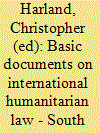

|
|
|
|
|
| Publication |
New Delhi, International Committee Of the Red Cross, 2010.
|
| Description |
xii, 1145p.
|
| Series |
Research information, 0280-6681 ; no. 6
|
|
|
|
|
|
|
|
|
|
|
|
Copies: C:1/I:0,R:0,Q:0
Circulation
| Accession# | Call# | Current Location | Status | Policy | Location |
| 055832 | 341.481/HAR 055832 | Main | On Shelf | General | |
|
|
|
|
| 2 |
ID:
171178
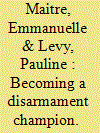

|
|
|
|
|
| Summary/Abstract |
The making of the Treaty on the Prohibition of Nuclear Weapons (TPNW) has put Austria and its involvement in nuclear disarmament in the spotlight. This study highlights several factors that led Austria to become a prominent voice in nuclear-disarmament debates. First, its involvement dovetails with the emphasis on humanitarian disarmament it has promoted since the 1990s. Second, a strong antinuclear identity pervades Austrian society. This “nuclear allergy” combines antimilitarism inherited from the Cold War and, more broadly, an aversion to nuclear power, including for energy purposes. These two considerations form the background to the increased activism of the Austrian Foreign Ministry on nuclear disarmament in international fora. But, equally, Austria’s crusade for the TPNW can be attributed to the engagement of a small team of diplomats implementing personal as well as national preferences in favor of disarmament.
|
|
|
|
|
|
|
|
|
|
|
|
|
|
|
|
| 3 |
ID:
080189
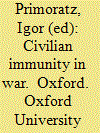

|
|
|
|
|
| Publication |
Oxford, Oxford University Press, 2007.
|
| Description |
xi, 263p.
|
| Standard Number |
9780199290741
|
|
|
|
|
|
|
|
|
|
|
|
Copies: C:1/I:0,R:0,Q:0
Circulation
| Accession# | Call# | Current Location | Status | Policy | Location |
| 052994 | 341.67/PRI 052994 | Main | On Shelf | General | |
|
|
|
|
| 4 |
ID:
102379
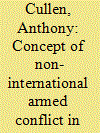

|
|
|
|
|
| Publication |
Cambridge, Cambridge University Press, 2010.
|
| Description |
xi, 219p.
|
| Standard Number |
9780521760485, hbk
|
|
|
|
|
|
|
|
|
|
|
|
Copies: C:1/I:0,R:0,Q:0
Circulation
| Accession# | Call# | Current Location | Status | Policy | Location |
| 055799 | 341.67/CUL 055799 | Main | On Shelf | General | |
|
|
|
|
| 5 |
ID:
112553
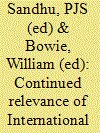

|
|
|
|
|
| Publication |
New Delhi, Vij Books India Pvt Ltd, 2011.
|
| Description |
101p.Pbk
|
| Series |
S-55
|
| Standard Number |
9789380177564
|
|
|
|
|
|
|
|
|
|
|
|
Copies: C:1/I:0,R:0,Q:0
Circulation
| Accession# | Call# | Current Location | Status | Policy | Location |
| 056525 | 341.481/SAN 056525 | Main | On Shelf | General | |
|
|
|
|
| 6 |
ID:
102527
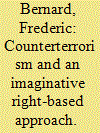

|
|
|
| 7 |
ID:
151163
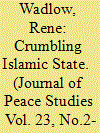

|
|
|
| 8 |
ID:
060887
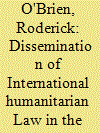

|
|
|
| 9 |
ID:
074646
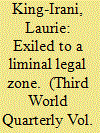

|
|
|
|
|
| Publication |
2006.
|
| Summary/Abstract |
For the past 60 years Palestinians have been positioned in a liminal political zone in a global system of nation-states. Although the Palestinian refugee crisis is the oldest and largest in the world, Palestinians are also relegated to a liminal legal zone in that the UN-established institutions such as the unrwa to deal with the Palestinians' needs and demands through exceptional channels outside the jurisdiction of the UN's human rights regime. As a consequence, Palestinians' rights are always open to question and frequently violated, whether they are living under occupation, as second class citizens in Israel, or as refugees in surrounding Arab countries. Although the Palestinian diaspora is situated in a variety of countries, legally the Palestinians are nowhere. This article examines the liminal legal zone to which Palestinians have been exiled, particularly in regard to refugee rights, but also in the context of international humanitarian law and international prosecution of war crimes committed against Palestinians. In examining this liminal legal zone, the article also notes that in the age of the global 'war on terror', we are all at risk of becoming Palestinians as legal guidelines and guarantees are eroded.
|
|
|
|
|
|
|
|
|
|
|
|
|
|
|
|
| 10 |
ID:
138337
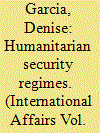

|
|
|
|
|
| Summary/Abstract |
This article introduces a novel concept, humanitarian security regimes, and enquires under what conditions they arise and what is distinctive about them. Humanitarian security regimes are driven by altruistic imperatives aiming to prohibit and restrict behaviour, impede lethal technology or ban categories of weapons through disarmament treaties; they embrace humanitarian perspectives that seek to prevent civilian casualties, precluding harmful behavior, protecting and ensuring the rights of victims and survivors of armed violence. The article explores how these regimes appear in the security area, usually in opposition to the aspirations of the most powerful states. The existing regimes literature has mostly taken a functional approach to analyzing cooperation, lacks a humanitarian hypothesis and does not explore the emergence of new regimes in the core area of security. The author argues that in the processes of humanitarian security regime-making, it is the national interest that is restructured to incorporate new normative understandings that then become part of the new national security aspirations. This article intends to fill this gap and its importance rests on three reasons. First, security areas that were previously considered to be the exclusive domain of states have now been the focus of change by actors beyond the state. Second, states have embraced changes to domains close to their national security (e.g. arms) mostly cognizant of humanitarian concerns. Third, states are compelled to re-evaluate their national interests motivated by a clear humanitarian impetus. Three conditions for the emergence of humanitarian security regimes are explained: marginalization and delegitimization; multilevel agency, and reputational concerns.
|
|
|
|
|
|
|
|
|
|
|
|
|
|
|
|
| 11 |
ID:
060477
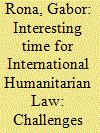

|
|
|
| 12 |
ID:
000704
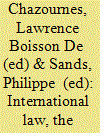

|
|
|
|
|
| Publication |
Cambridge, Cambridge University Press, 1999.
|
| Description |
xxiii, 592p.
|
| Standard Number |
0521652421
|
|
|
|
|
|
|
|
|
|
|
|
Copies: C:1/I:0,R:0,Q:0
Circulation
| Accession# | Call# | Current Location | Status | Policy | Location |
| 042030 | 341.734/CHA 042030 | Main | On Shelf | General | |
|
|
|
|
| 13 |
ID:
058925
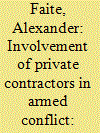

|
|
|
| 14 |
ID:
105424
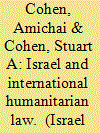

|
|
|
|
|
| Publication |
2011.
|
| Summary/Abstract |
The article argues that throughout her history Israel has evinced sensitivity to international law requirements. Over time, however, changes have occurred in the mindset within which that attitude is framed. Broadly speaking, during the early years of statehood, Israel's expressions of respect for international law articulated an essentially utilitarian attempt to gain legitimacy. More recent pronouncements, by contrast, reflect two other developments, which to some extent interact. One is the growing diffusion of the decision-making process in Israel with regard to national security affairs. The second is the growing influence within Israeli political and public life of several institutions, governmental and non-governmental, whose respect for international law is based on their perception of the intrinsic legitimacy of that corpus.
The article illustrates the impact of those processes, inter alia through an examination of the influence exerted by the IDF's International Law Branch (DABLA), especially with reference to targeted killings.
|
|
|
|
|
|
|
|
|
|
|
|
|
|
|
|
| 15 |
ID:
157746
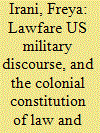

|
|
|
|
|
| Summary/Abstract |
In this article, I aim to reorient debates, in International Relations and Law, about the relationship between law and war. In the last decade, writers have challenged common understandings of law as a limit on, or moderator of, warfare. They have instead claimed that law is often used as a ‘weapon of warfare’, describing such uses as ‘lawfare’. Below, rather than arguing that law is either a constraint on or an enabler of warfare, I examine how law comes to be represented as such. Specifically, I examine representations, primarily by US military and other governmental lawyers, of ‘non-Western’ invocations of the laws of war, which seek to constrain the policies or practices of the US or Israeli governments. I show how these authors cast such invocations as not law at all, but as tools of war. I suggest that this move rests on, and reproduces, colonial discourses of ‘non-Western’ legal inadequacy or excess, which serve to render ‘non-Western’ law ‘violent’ or ‘war-like’. I show that the referents and boundaries of law and war are stabilised by notions of civilisational difference, which serve to give meaning to what law is, what war is, and whether particular claims or practices are understood as martial or legal.
|
|
|
|
|
|
|
|
|
|
|
|
|
|
|
|
| 16 |
ID:
186519
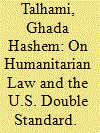

|
|
|
|
|
| Summary/Abstract |
U.S. criticism of its client/ally Saudi Arabia regarding the killing of journalist Jamal Khashoggi immediately diminished the kingdom’s ability to secure funds for its latest mega development project, the Neom convention center. U.S. intelligence pinned the crime on aides to Crown Prince Muhammad Bin Salman (MBS). At the same time, a seemingly unauthorized operation, later attributed to former president Donald Trump, killed a top Iranian commander, Qasem Suleimani, by a drone strike. Congress was not involved and the UN protested this as a violation of Article 51 of its Charter, emphasizing that this was justified in a case of imminent threat, undertaken only by a state. Encouraged by drone technology, the U.S. found it easy to locate the target and minimize collateral damage. International lawyers and military experts are still debating the legitimacy of such action. The U.S. is persisting in claiming that it upholds the standards of international humanitarian law which sometimes sanctions targeted killing. A number of international law professors continue to deride U.S. action as illegal, while the latter continues to describe its actions as defensive in nature. Organizations such as Human Rights Watch lament the reluctance of previous U.S. presidents to define targeted killing.
|
|
|
|
|
|
|
|
|
|
|
|
|
|
|
|
| 17 |
ID:
127159
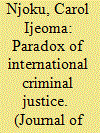

|
|
|
|
|
| Publication |
2013.
|
| Summary/Abstract |
Although early exploits of the international criminal tribunals seem promising, a unique empirical evaluation of its impact in global applications of criminal justice proves defective. A well-intentioned pursuit of criminal justice will ensure consistency and stability in the enforcement of the international humanitarian laws and principles to prevent impunity in situations of war or armed conflict. This study makes a trans-national evaluation of effectiveness of the criminal justice system with particular reference to issues that derive from the Nigeria-Biafra (Biafra) war. The framework of analyses is based on genocidal issues and incidences of war crimes highlighted in Chinua Achebe's There was a Country: A Personal History of Biafra and related literature on the Biafra war.
|
|
|
|
|
|
|
|
|
|
|
|
|
|
|
|
| 18 |
ID:
068791
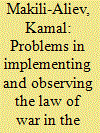

|
|
|
| 19 |
ID:
123137
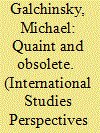

|
|
|
|
|
| Publication |
2013.
|
| Summary/Abstract |
In the "war on terror," the Bush administration sought to delegitimize international human rights law (IHRL), international humanitarian law (IHL), and customary law by claiming that they were "quaint" and "obsolete" in the face of the threat from al Qaeda. On this view terrorist suspects fell into a legal "black hole" and could be deprived of the most basic rights, such as the right to recognition as persons before the law. International law supporters reacted by reconsidering fundamental questions, like the degree to which human rights may be restricted in states of emergency, and the clarity of the civilian/combatant distinction in IHL. In response to the black hole theory, the "full coverage" and "evolutionary" theories identified four principles within IHL and IHRL that enable existing law to address terrorist threats: the principles of complementarity, maximal extension, restricted derogation, and regulated detention. The Obama administration has so far enacted the "evolutionary" approach.
|
|
|
|
|
|
|
|
|
|
|
|
|
|
|
|
| 20 |
ID:
105463
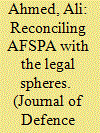

|
|
|
|
|
| Publication |
2011.
|
| Summary/Abstract |
The present paper analyses and examines the Armed Forces Special Powers Act (AFSPA) in respect of legal aspects. It first discusses it in terms of domestic law, international humanitarian law (IHL) and human rights law. Given India's obligations under international human rights instruments going beyond domestic law is necessary in any such discussion. Ensuring complementarity between the Act in its application in armed conflicts and IHL, would contribute towards making the Act more 'humane'. The second part discusses the Act from security perspectives. In doing so, it reaffirms that respect for human rights and humanitarian law in countering insurgency is of strategic import. In conclusion,it makes some recommendations for the military which will enable it ensure that AFSPA and the IHL complement each other.
|
|
|
|
|
|
|
|
|
|
|
|
|
|
|
|
|
|
|
|
|